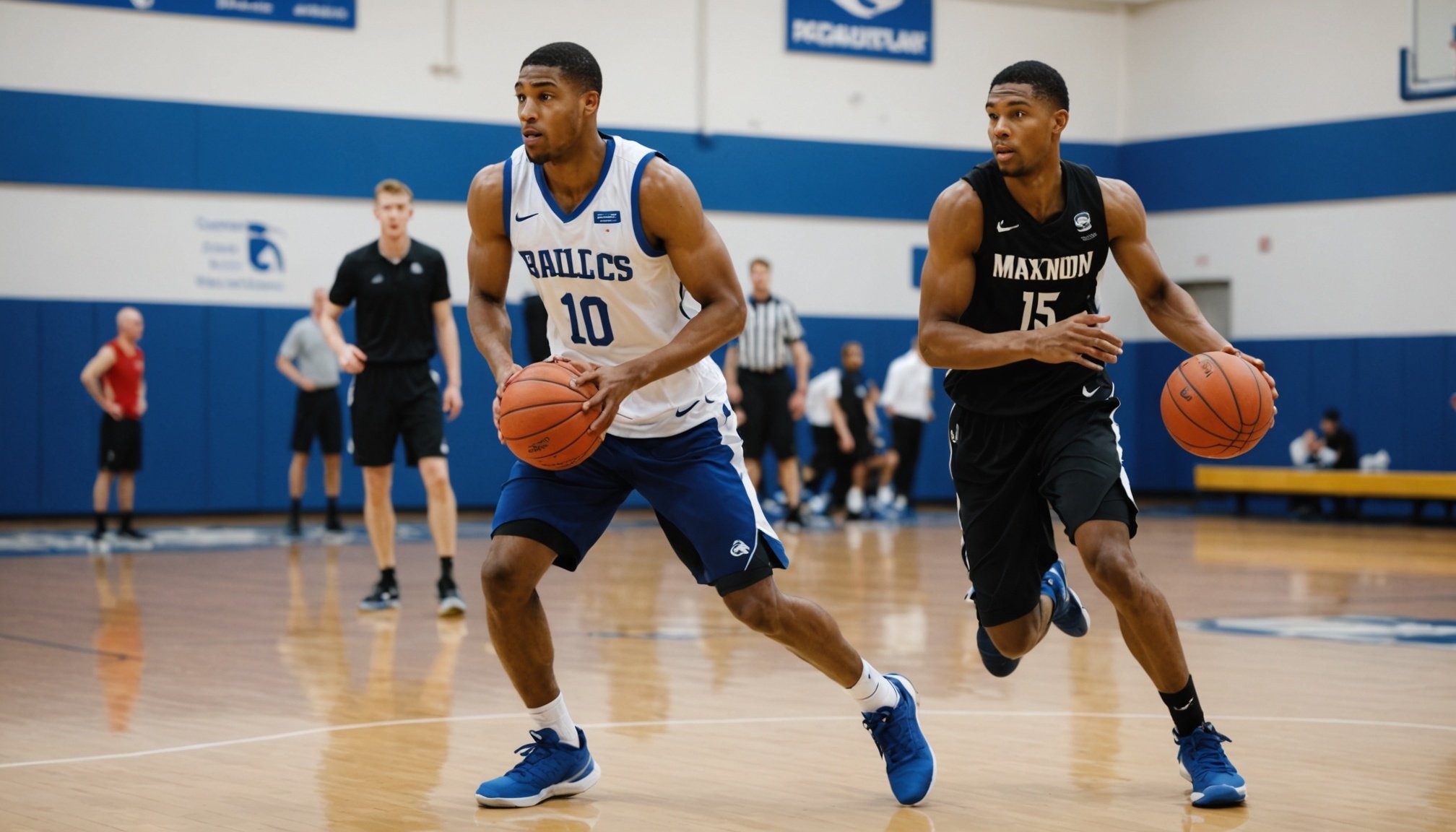Importance of Endurance Training in Basketball
Endurance training is a vital component for enhancing basketball performance, particularly during the demanding nature of game seasons. In basketball, players are required to sustain activity over extended periods, making endurance indispensable.
Enhanced stamina, which results from diligent endurance training, has numerous benefits. Among them is the ability to maintain high levels of play even in the later stages of matches. Athletes with superior endurance can execute skills with greater precision and less fatigue, which is crucial for successful basketball performance.
In parallel : Elevate your game: key shot-blocking skills every uk basketball center should master
Off-season training provides players with the opportunity to focus intensively on building endurance. By concentrating on this aspect when competitive pressures are minimized, athletes prepare themselves physically for the extensive demands of the upcoming season. This dedicated period is essential to boost stamina and resilience, allowing players to return stronger and more robust.
The impact of endurance on game performance cannot be underestimated. It not only enhances athletic capabilities but also contributes to injury prevention by reducing the risk of fatigue-induced errors and overexertion injuries. Therefore, prioritizing endurance training, particularly in the off-season, ensures a balanced approach to advancing basketball performance and maintaining athlete health.
In the same genre : Elevating game readiness: creative drill development strategies for uk basketball coaches facing high-pressure situations
Key Endurance Training Techniques
Endurance in basketball is not merely the ability to run longer; it’s about maintaining intensity and focus throughout the game. Implementing effective training techniques can make all the difference.
Aerobic Conditioning Exercises
Basketball players can benefit immensely from incorporating long-distance running into their routines. This form of aerobic conditioning improves cardiovascular health and increases stamina. While running is essential, adding interval training can amplify endurance benefits further by alternating periods of high intensity with rest or lower activity. Besides, cycling and swimming are excellent cross-training options. These exercises keep the workouts diverse and can reduce the risk of injury by lessening the stress on joints while still building endurance.
Sport-Specific Drills
Basketball-focused drills are crucial to conditioning. These drills emphasize agility and speed training, pivotal for fast-paced gameplay. Incorporating exercises like shuttle runs or cone drills can significantly improve on-court performance. Moreover, game simulations in a training set-up provide players the advantage of honing skills in a more realistic environment, leading to improved reflexes and decision-making under pressure.
Resistance Training for Endurance
Strength training doesn’t just build muscles; it supports endurance by enhancing overall body efficiency. Recommended exercises, like squats or lunges, should prioritize proper form and technique to maximize benefits and prevent injury.
Recovery Strategies
Recovery plays a crucial role in endurance training, as it allows the body to repair and strengthen itself, preventing injuries in the long term. Without adequate recovery, athletes risk overtraining, which can lead to muscle strains or chronic fatigue.
To optimise muscle recovery, incorporating various techniques is essential. Stretching, for example, helps improve flexibility and reduce muscle tension. It’s crucial after workouts to prevent stiffness. Similarly, foam rolling is an effective self-massage technique that aids in loosening tight muscles and improving blood flow, thus speeding up recovery.
Beyond physical methods, sleep and nutrition significantly impact recovery. Sleeping provides the necessary downtime for the body’s natural repair processes. It’s during deep sleep that growth hormone release peaks, fostering muscle recovery and growth. Adequate sleep also helps regulate stress hormones, contributing to faster rehabilitation post-exercise.
Nutrition is no less important. Consuming the right balance of proteins and carbohydrates aids in muscle repair and restoration of energy levels. Hydration is equally vital, as it ensures that nutrients are transported efficiently throughout the body, facilitating quicker recovery. Integrating these strategies creates an all-encompassing approach to maintaining peak athletic performance.
Nutritional Support for Endurance Athletes
Embarking on endurance training requires a specialised nutrition plan to sustain energy and optimise performance. Essential nutrients are crucial for athletes, providing the fuel required for prolonged physical activity.
A well-rounded endurance diet should include carbohydrates as the primary energy source, ensuring glycogen stores are replenished consistently. Pairing carbohydrates with proteins aids in muscle repair and recovery, while healthy fats provide a sustained energy source.
Meal Planning and Timing
Strategising when to consume meals and snacks is essential for effective athlete fueling. Timing meals to coincide with training sessions maximises energy availability and recovery. Consuming a carbohydrate-rich snack about 30-60 minutes pre-workout can enhance performance, while a post-workout meal with carbs and proteins supports recovery.
Hydration Strategies
Hydration is integral during training, as it impacts endurance and overall performance. Endurance athletes should aim to maintain proper hydration levels by consuming fluids consistently throughout the day. Water and sports drinks can be used during intense sessions to replace electrolytes lost through sweat.
Incorporating these nutrition strategies can effectively support endurance athletes in their training endeavours, allowing them to achieve their performance goals with confidence.
Expert Tips from Coaches and Trainers
Coaching insights are a crucial part of any athlete’s journey towards basketball improvement. Coaches frequently recommend focusing on endurance training practices. Endurance is key to lasting through intense matches, and implementing specific strategies can enhance this attribute significantly. Incorporating varied exercises, such as interval running and high-rep bodyweight circuits, can build stamina over time.
Another element to consider is avoiding common mistakes in off-season training. Often, athletes focus too much on their strengths, neglecting areas that need improvement. This unbalanced approach can lead to setbacks in performance. Continuous evaluation with a trusted coach can help rectify any such tendencies.
Insights into crafting a personalized training plan are invaluable for tailored development. It begins with assessing individual needs and goals, using data like past performance and physical assessments. A training advice plan accounts for personal strengths and targets specific weaknesses, ensuring that each workout serves a purpose in the grand scheme of athletic development.
Personalized plans allow for adjustments and flexibility, promoting sustainable progress. With these enhanced strategies, athletes can approach personal growth effectively, fostering improvements throughout all stages of their career.
Case Studies and Testimonials
Exploring the personal experiences of UK basketball players provides valuable insights into endurance training. These include intriguing athlete testimonials that showcase a blend of persistence and strategic training methods, ultimately leading to improved performance on the court.
Consider the journey of various players, whose training success stories reveal a transformative impact on their athletic careers. Emphasising regime consistency and balance, these athletes have progressively adapted their strategies, resulting in notable endurance enhancements. For instance, players often discuss how a combination of interval workouts and recovery sessions have been pivotal in boosting stamina.
Diving into an analysis of technique effectiveness helps us understand what truly works in practice. Through real-world applications, athletes have identified that maintaining an optimal pace and focusing on breathing techniques can dramatically influence endurance outcomes. These adjustments, reported in numerous athlete testimonials, underscore the significance of tailoring training plans to individual needs.
The lessons learned from these experiences underline key strategies: prioritising rest, committing to structured routines, and maintaining mental resilience even amidst challenges. Together, these stories form a tapestry of resilience and success, motivating emerging players to craft their narrative through strategic endurance training.






